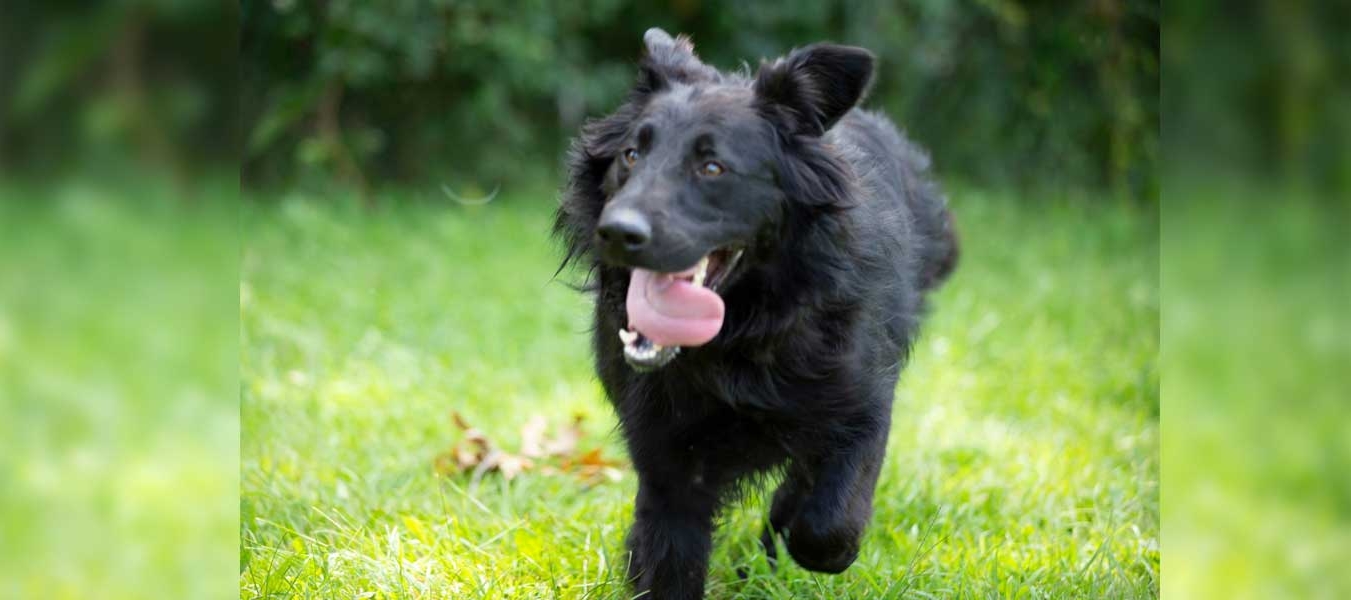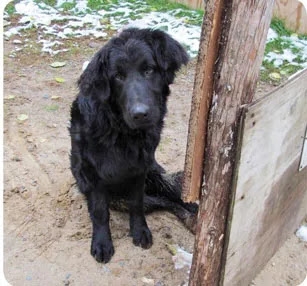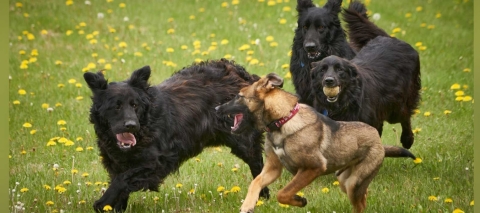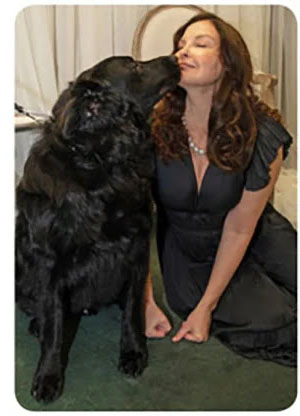
In the Fall of 2018, a Collie/Newfoundland Mix dragged himself by his front paws along a road on the Leech Lake Indian Reservation in Northern Minnesota. His obvious suffering moved one of the residents to ask for help from the Minnesota State Humane Agent, Gail Anderson. The dog was one of many that roamed free in the impoverished community-a familiar, friendly dog called Makwa, or "Bear" in Ojibwe.

to walk
Makwa's family didn't have the means to investigate or treat the sudden paralysis the dog seemed to be suffering. They loved him though, and they agreed to surrender him to Gail in the hope that she could get help for him. Gail took him to live on her porch until she could find a permanent situation for him, but with cold weather on its way, she knew there was no time to lose to find help for him.
While Makwa didn't technically "belong" to anyone anymore, his radiant spirit inspired anyone who met him or heard his story to try to help as Gail reached out to the wider community and shared Makwa's story. For Makwa's sake, they all joined Gail in an urgent effort to find help for him, networking him far and wide on social media, securing a used dog wheelchair so he could get around, and raising money for his medical assessment.
Though he was just 1 year old, poor Makwa was in rough shape: he had terrible trouble standing on his hind legs and poor circulation in the right hind leg. His vets warned he might never again walk on his own, and he would likely need close daily care to stay exercised, healthy, and clean.
Makwa's supporters grew increasingly disheartened by his bleak prospects as they reached out to rescues and shelters across the state, only to be turned away. Many of the supporters had never before advocated for an animal; they'd never even thought about what can happen to a desperate dog or cat. Now that they had joined Makwa on his journey, they understood how precarious the lives of homeless animals can be. They also understood the difference their help could make, and they were determined to see him through to the future he deserved.

After calling and being turned down by dozens of organizations around Minnesota, Gail called Home for Life.® She explained Makwa's situation, and we realized he had no chance in his condition, living in an unheated area, unable to walk and with no offers of help from shelters or rescues.
We didn't know what the future held for Makwa when we agreed to help, if he would ever walk again. Projecting the future, and the burden it would be to care for him, was daunting. It takes more than mercy and goodwill to restore the health of special animals like Makwa -- it takes a commitment of time, labor and funding for the lifetime of the animals, which can be 10 years, or more. Most importantly, it requires a renewed view of what is possible for an animal who has been turned away from other rescues or shelters for help, and to see them not as a problem to be solved but as an untapped treasure.
So we focused on restoring Makwa's health and all he could do and not his deficits. The great care he received at Home for Life®, from veterinary attention to high-quality nutrition to rehabilitation, which included medicine, water and laser therapy soon helped restore his vitality and strength. This loving and individual care that is integral to Home for Life® resulted in a miracle when Makwa regained the ability to walk again! Although he will always need attentive care to maintain his mobility and hygiene, he is able to enjoy playing and even running in his fashion with his new dog family.

News of Makwa's amazing recovery has also uplifted the community that first helped him. They can now see their own compassion and kindness, not just as concepts but as visible and practical facts in the world, embodied in one dog, Makwa, standing and even running! On his own four paws!

Corraling Jimmy, with Zee( toy in mouth) and best friend Peter:
photo by Mark Luinenburg
Animal Nation: Each animal's individual happiness and well-being is a victory for all animal welfare.
Thinking about millions of animals who lose their lives each year is overwhelming. The estimate is that between 2-4 million cats and dogs are killed annually because no one wants them. Even people who care are challenged to understand how they can make a difference with a problem of this scale.
When we look at animal homelessness and the vast numbers being killed each year through a wide scope, it's difficult to see the individuals. They become numbers and abstractions. If we operate only from this frame, we begin to lose the sense of our original mission and that's when dogs and cats like Makwa fail to find the help they so desperately need. Because they are only one animal, it is easy to turn away and ignore them or justify their death as if they are collateral damage. But the truth is, we're only able to understand the depth of a problem through an individual who is experiencing the problem firsthand and through their story.
One of the many miracle animals of Home for Life, Makwa can walk now although with a distinct gait, but has a specially designed ramp so that he can access the larger runs from the area off his dog door. As he ages, he will likely need medication and further rehabilitation to maintain his mobility and comfort. Makwa is popular with our other dogs and has mentored several younger dogs and puppies who have come to Home for Life uncertain and afraid. His optimism and happy personality imparts confidence and encouragement to the uncertain newcomers, pups like German Shepherd Jimmy and his brother JohnJohn who were on the euthanasia list at humane society due to timid, fearful behavior- at the age of only 4 months!

I'm just overwhelmingly thankful that Makwa ended up with Home for Life.® He is a sincerely beautiful soul, as everyone he was/is in contact with will agree. Your organization does amazing work and doesn't shy away from disabilities as others do -- it's just not their mission, and I understand. However, there is a huge need to help these animals, and I will continue to support organizations strongly who do the very hard and costly work that you do. Sanctuaries are heaven on earth for the neediest souls. Makwa and all of your special residents are achieving real meaning to their lives, that they may never have known otherwise. I also believe you are setting standards of care for how animals with challenges can be redefined to achieve quality of life opportunities. Home for Life®, I hope others emulate your work. How fortunate our animals would be!"
— Gail Anderson, Minnesota Federated Humane Societies Agent
The millions of suffering, lonely and unwanted animals are made up of individuals like Makwa. Whenever we disregard or devalue one of them, we place all animals in jeopardy, since any dog or cat can lose their home, become old, injured or ill and unwanted. What keeps animals safe and cherished is our attitude towards them, and our capacity to care. For animals who are vulnerable, everywhere, we can't turn away from tough cases like Makwa or consider their fate of negligible consequence. Saving an animal is more than a metaphor. It is meaningful because preserving the chance for one animal takes a stand for all animals in similar situations and makes visible and practical what is possible. In a system designed to handle problems on a mass scale, individuals can be overlooked. Yet behind every data point and every number is an individual, with a story and the need for someone to recognize all that makes them special.
Home for Life's® focus on overlooked individuals like Makwa has enabled us to spot gaps in the animal welfare system where cats or dogs are underserved and vulnerable, to identify where change needs to happen, and where there is opportunity for widespread improvement.

2019 Fall Gala!
We remember miracles and take courage from them.
Miracles often mark a turning point where things start to get better. That's because miracles disrupt defeatism -- they help us believe that obstacles can be overcome and that our loftiest goals are can be realized.
How do miracles happen? Through prayers? Luck? Serendipity? The truth is that we can initiate a miracle just by caring. A single miracle, like Makwa's story, inspires hope and helps us be alert to the moments when we can help shape patterns of change in a positive direction. Makwa's inspiring story proves that one person can make a difference to be the difference desperate animals need to have hope for a new life!
